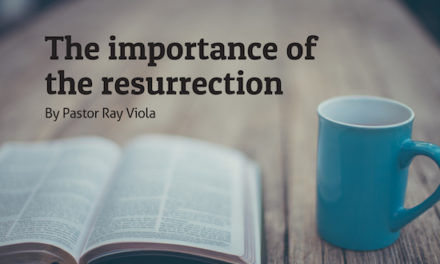“Be still and know that I am God.” (Psalm 46:10) Have you ever meditated on this verse? The first four words are both a command and an invitation inextricably linked to the declaration made in the last half of the verse, for it is impossible to be still unless one has an intimate, personal relationship with the One who has eternal, unchanging existence. Indeed the message, the command of the world is the opposite – to go, to do, to be busy, to be focused on self and not know God. Satan does everything he can to keep a non-believer and hinder a believer from developing that absolute certainty and conviction born of personal experience and interaction with God.
The God of Psalm 46:10 is Elohim – the sovereign, almighty, triune Creator of Genesis 1:1– and He says, “I am your God.” (Isaiah 41:10, emphasis added) The fact is that He is God over ALL creation, whether or not that is recognized or acknowledged. (See Daniel 4:35 & Psalm 135:6.) He is God at all times and beyond time itself, in all places and beyond the spaces of this physical realm; in every way, in every where, in every time, and in every area of our puny, miniscule lives, HE IS GOD!! For a born-again child of God, there is a wonderful freedom that comes when we comprehend and accept the reality that He is God and we are not! This means the compassionate, all-knowing God is responsible for our life, for all that happens to us and through us and even within us, for He is “the author and perfector of (our) faith”. (Hebrews 12:2)
When Moses led the children of Israel out of Egypt, they found themselves facing the Red Sea with the Egyptian army in hot pursuit and no way of escape. In this scenario we see a vivid illustration of what it means to “Be still and know that I am God.” God miraculously held back the enemy and simultaneously opened the way of escape for His people. But then the time came for the people to take an active part in their own deliverance also, for God did not teleport them across the Red Sea! So, to be still does not sanction laziness or irresponsibility, nor does it mean withdrawal from life. What does it mean? To “be” means a state of existence, and one definition of “still” is “without movement”. Another translation renders this as “cease striving”. In other words, we’re to surrender and give up trying to run our own life. Why? (Haven’t you discovered yet how poorly that works?) “For thus the Lord God…has said, ‘In returning and rest you shall be saved; in quietness and trust is your strength.’ ” (Isaiah 30:15) And Jesus has told us, “apart from Me you can do nothing.” (John 15:5) The Christian life is a matter of accepting that God is in control and then actively participating in His program, but this isn’t just a one-time thing. The word “still” also has the seemingly contradictory meaning of “without ceasing, continuing”, so we must constantly recognize and surrender to God’s sovereignty over our life.
To “be still” also means to be silent – no argument or complaining. (OUCH!) The simple truth is that when we’re talking, we’re not listening. “The LORD is good to those who wait for Him, to the person who seeks Him. It is good that he waits silently for the salvation of the LORD. Let him sit alone and be silent”. (Lamentations 3:25,26,28a) “My soul waits silently for God only; from Him is my salvation. My soul, wait silently for God only, for my hope is from Him.” (Psalm 62:1,5) Being “still” also carries the connotation of being calm and tranquil. “Fret not yourself” is the command of Psalm 37:1. How is this possible in today’s chaotic world and disintegrating society? Jesus tells us that our peace can be found in Him because He has overcome the world (John 16:33). When we “listen” to the Lord’s words and accept what He wants to give us (Himself!), we can experience serenity of soul.
Taking God at His word results in a greater understanding of and a deeper relationship with our God, which enables us to trust Him more, giving us more peace. Having a constant attitude of surrender and sensitivity to God’s word (and the Living Word, Jesus) enables us to know Him in a meaningful and personal way, and the resulting increasingly intimate relationship with Him is what makes it possible for us to have peace and tranquility of soul, to “be still”. King David’s life amply portrayed this truth (See for example, 1 Samuel 30:1-20.), and he experienced quietness of soul (Psalm 131:2). David knew his God, as evidenced by this prayer: “Thine, O LORD is the greatness and the power and the glory and the victory and the majesty, indeed everything that is in the heavens and the earth; Thine is the dominion, O LORD, and Thou dost exalt Thyself as head over all. Both riches and honor come from Thee and Thou dost rule over all, and in Thy hand is power and might; and it lies in Thy hand to make great, and to strengthen everyone.” (1 Chronicles 29:11,12) That is God! Knowing Him will enable you to be still, and being still – continually trusting and tranquil and listening – will bring you a greater revelation of your God.






